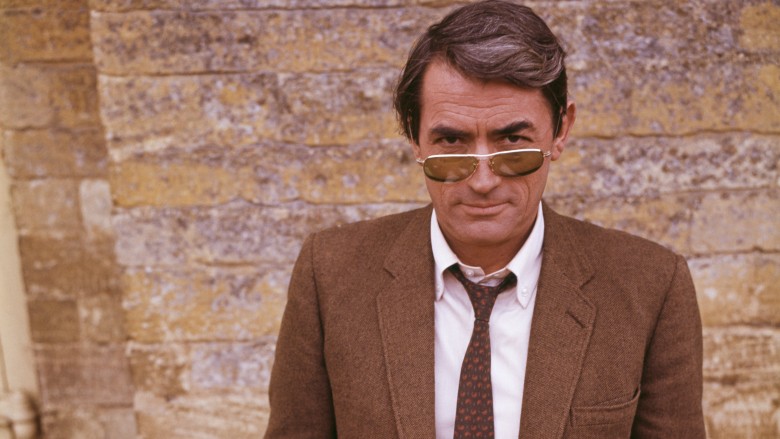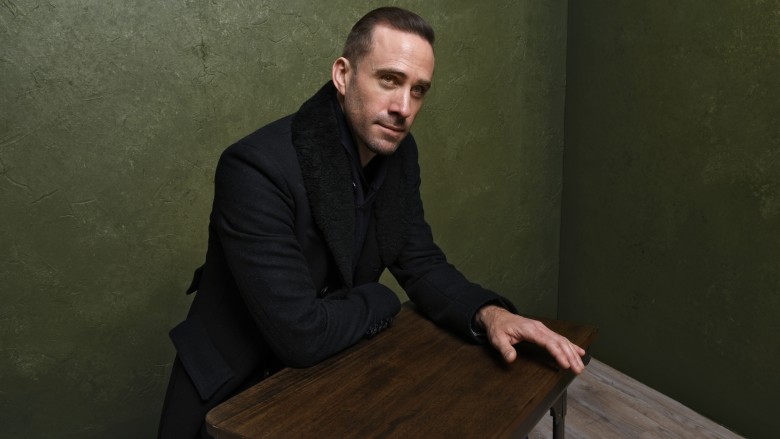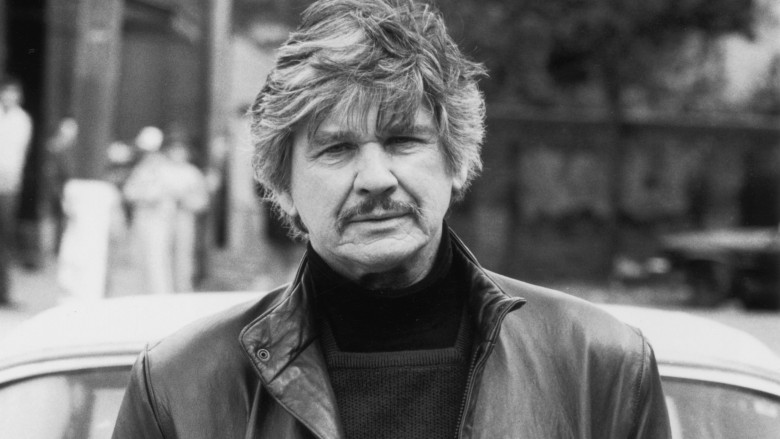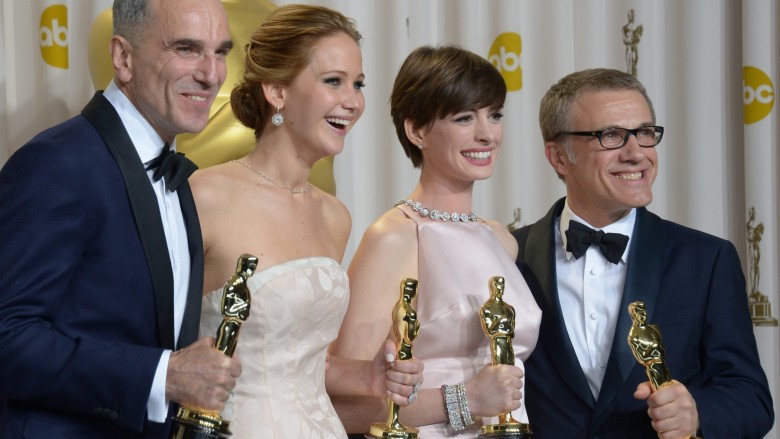Actors Who Turned Down Oscar-Winning Roles
If you're a scientist, you dream of winning the Nobel Prize. If you're a football player, you want the Heisman. And if you're an actor, you want to get your hands on a little naked man named Oscar. This golden statuette has reduced adults to tears and caused people to jump up and down for joy, all because they want their peers to like them, to really like them.
So when a juicy role comes along, you'd expect an actor or actress to snatch it up ASAP. But sometimes, that part just slips through their fingers...and then winds up earning somebody else an Oscar. For example, Liam Neeson turned down the chance to play a top-hatted president, and Sean Connery passed on the opportunity to have a nice Chianti with his liver and fava beans. And then there were the ladies and gentlemen below, all talented stars who made some questionable decisions when it came to their careers.
Gregory Peck
Gregory Peck is a legitimate Hollywood icon, earning the number 12 spot on the American Film Institute's list of 50 greatest screen legends. In addition to starring in classics like Roman Holiday and The Omen, Peck served as the president of the Academy of Motion Picture Arts and Sciences for three years. But despite his impressive filmography and inside track with Oscar voters, it took Peck quite some time to take home his gold statue: he was nominated four times before finally emerging victorious with To Kill a Mockingbird.
But if Peck had made a different career move, he could've claimed his prize long before his turn as Atticus Finch. After playing a disillusioned shootist in a western called The Gunfighter, Peck was immediately offered the lead role in High Noon. Based on his previous performance, Peck's agent thought he would've been perfect as Will Kane, the small-town marshal forced to confront a gang of outlaws alone when his friends all ditch him. But despite his agent's encouragement, Peck thought High Noon was too similar to The Gunfighter, and hoping to avoid typecasting, he passed on the part.
As a result, the role went to Gary Cooper, who earned his second Best Actor Oscar for playing the abandoned lawman, which evidently made Peck second-guess his decision. "I don't think I would have been as good as Gary Cooper," Peck admitted. "But I still think it would have been a good film with me in it."
Would've, could've, should've, man. Would've, could've, should've.
Joseph Fiennes
At the 66th Academy Awards, Ralph Fiennes found himself nominated for his performance as Amon Goeth, the sadistic Nazi in Steven Spielberg's Schindler's List. A few years later, Roman Polanski would offer Fiennes a role in another Holocaust film...only this time, the Fiennes in question was Ralph's brother, Joseph. And the role wasn't for a villainous guard. Instead, Polanski wanted the younger Fiennes to play the lead in his new film, The Pianist.
Of course, everybody knows Adrien Brody got the part and then won the award for Best Actor. So why did Fiennes pass on playing Polish composer Wladyslaw Szpilman? Well, according to Fiennes, he was more interested in doing stage work, specifically starring in Christopher Marlowe's Edward II. "I never went into acting to do film," Fiennes explained to The Telegraph. "I went into it to do theater—classical roles." The actor added that movies just aren't as "physically, mentally, or spiritually challenging as theater," and he prefers plays because it's "good to sweat."
When asked by The Guardian if he regretted passing on the part, Fiennes wisely responded, "So it would feel weird to say, 'Oh yeah, I could have been there on Oscar night,' because the whole chemistry of the film is built around that particular actor." In other words, while Fiennes might've been a great Szpilman, there's no guarantee he would've won an Oscar. He could've acted his heart out but still lacked that extra something special Brody brought to the role. And even if he'd earned the award, we probably wouldn't have gotten one of the most memorable moments in Oscar history.
Burt Reynolds
Once considered one of the sexiest men in Hollywood, Burt Reynolds was a box office king in the 1970s, with hits like Smokey and the Bandit, Cannonball Run, and The Longest Yard. (And let's not forget his comeback performance in Boogie Nights.) But even more impressive than his actual filmography is the list of all the movies Reynolds turned down. According to the man himself, he passed on playing Edward Lewis (Pretty Woman), John McClane in Die Hard, and Han Solo. And while he's okay with most of his decisions, he admits it hurts when he thinks of the roles he lost to Jack Nicholson.
In his autobiography But Enough About Me, Reynolds confesses he turned down the part of Randall P. McMurphy in One Flew Over the Cuckoo's Nest. Obviously, the role then went to Nicholson, who won a Best Actor Oscar for his incredible performance. Now, you'd think Reynolds would've learned his lesson about passing on plum parts, but when director James L. Brooks offered him the role of ex-astronaut Garrett Breedlove in Terms of Endearment, Reynolds said he couldn't do it because he'd already committed to a race car comedy called Stroker Ace.
This...was not a smart move. Brooks had written the part of Breedlove specifically for Reynolds, so he probably would've crushed it as the retired spaceman. Instead, Nicholson got the part and won an Oscar for Best Supporting Actor. The film also picked up four additional awards—including Best Picture—and did incredibly well in theaters. As for Stroker Ace, well, it was a box office and critical bomb. Reynolds also marks the movie as the moment his star began to fade. "I regret that [decision] more than anything," Reynolds lamented, and as he told Larry King, "There's no awards in Hollywood for being an idiot."
Charles Bronson
At the 64th Academy Awards, Jack Palance stunned (or perhaps "baffled" is a better word) the audience when he decided to do a few one-armed pushups on stage. But hey, the guy was excited. After all, the 73-year-old had just won his first Oscar, a Supporting Actor trophy for his turn as Curly Washburn in City Slickers. A grizzled old cowboy with little patience for greenhorns, Curly is one of Palance's best-remembered roles, but we could've missed out on the actor's athletic abilities if only Charles Bronson had been a little more polite.
One of Hollywood's toughest tough guys, Bronson is probably best remembered for declaring war on thugs everywhere in the Death Wish series. But before he morphed into a modern-day vigilante, Bronson played in a long list of westerns, including classics like Once Upon a Time in the West and The Magnificent Seven. So we can totally envision him giving Billy Crystal a hard time out on the cattle trail. Of course, Bronson wasn't the first pick for the part. That was actually Palance, but he wasn't sure he could commit due to a prior obligation. With only a little time left before shooting started, Crystal sent the script to Bronson and eagerly waited for the veteran actor's response.
According to Crystal, that response involved a whole lot of four letter words.
In his autobiography, Still Foolin' 'Em, Crystal claims Bronson called him up after reading the screenplay and immediately started cussing him out. "F— you," Bronson said. "I'm dead on page 64! How dare you send this to me. You have a lot of nerve. I don't die in my films." Crystal then briefly considered pointing out how Bronson's character was killed in The Magnificent Seven, but Bronson's constant stream of obscenities cut him off. Fortunately for everyone involved, Palance was able to get out of his previous commitment and make the movie. It was a happy ending for everybody but Bronson, who missed out on his golden opportunity.
Harrison Ford
Look, winning an Oscar is great and all, but it isn't the ultimate test of an actor's talent. Plenty of amazing performers have missed out on Oscar glory, such as Peter O'Toole, Cary Grant, and Orson Welles. As of the 89th Academy Awards, actors like Robin Wright, Mia Farrow, Martin Sheen, and Jeff Goldblum have never even been nominated—and then there's Harrison Ford. So far, he's only had one Oscar nod in his entire career, for The Fugitive. On the other hand, he's the guy who played both Han Solo and Indiana Jones. Who needs an Oscar when you're the two greatest action heroes of all time?
Still, it's probably nice to get the validation of your peers, and if Ford had signed up for Syriana, maybe he'd have a nice little addition to his mantel right now. As it turns out, Ford was originally offered the role of CIA Agent Robert Barnes, a part that eventually helped George Clooney win that sweet Oscar gold. So why did Ford say no thanks? As he explained to Contact Music, he "didn't feel strongly enough about the truth of the material." But after watching the film, Ford has changed his opinion on the issue. Today, he admits, "I think the film underwent some changes, and I think a lot of it is very truthful. The things that I thought weren't, were obviated after I left the table."
However, while Ford now wishes he'd taken the gig, he might have second thoughts after considering what happened to poor Clooney. During one intense scene, the silver-haired actor injured his spine so badly that the he actually considered committing suicide due to the pain. No award is worth that kind of agony.
Gwyneth Paltrow
When The Danish Girl hit theaters in 2015, it was nothing short of a miracle. The film had been gestating for at least ten years, with actors and directors continually abandoning the project to rot in development hell. After all, a movie about the first person to receive male-to-female sex reassignment was considered kind of risky. Nevertheless, Nicole Kidman signed on in 2008, hoping to play the part of Einar Wegener/Lili Elbe, the girl of the title...but for the next three years, she was pretty much the only person permanently attached.
The Danish Girl just couldn't keep a director—Anand Tucker, Tomas Alfredson, and Lasse Hallstrom all jumped ship, one after the other. Casting the role of Gerda Wegner, Lili's faithful wife, was also something of a struggle. Charlize Theron was first up, but passed on the part. With Theron out of the running, the role made its way to Gwyneth Paltrow, who was all set to star when The Danish Girl curse struck yet again.
Before cameras could start rolling, the shooting location suddenly changed, and this was bad news for the Oscar-winning star. A mother of two, Paltrow didn't want to spend so much time away from her kids, and with this new development, Paltrow was forced to bow out. Still holding out hope of making the movie, the producers offered the role to Rachel Weisz, who joined up before—as you can probably guess—backing out in 2011. With setback after setback, the film eventually faded away, until Tom Hooper, Eddie Redmayne, and Alicia Vikander rode to the rescue. With this new crew at the helm, The Danish Girl finally came to fruition, snagging a Best Supporting Oscar for Vikander along the way.
Julia Roberts
When Shakespeare in Love beat out Saving Private Ryan for the Best Picture of 1998, everybody around the world had the same exact reaction. There was a lot of jaw dropping, head scratching, and people going, "Say what?" But perhaps the Academy honored the cross-dressing caper because of its tortured backstory. As it turns out, Hollywood had been trying to make Shakespeare in Love since the early '90s. Before Miramax scooped it up, the movie was a Universal project, and the studio spent quite a bit of cash building sets and sewing costumes. And then, at the last moment, a key player dropped out of the picture, allegedly setting the company back millions.
So who sank the project? Well, if you noticed the photo above, then you've probably already guessed it was Julia Roberts. The superstar with the perfect smile was offered the role of Viola de Lesseps, the wannabe actress who romances Shakespeare. According to People, she was just one contract away from making the picture when she got some bad news. Roberts was hoping Daniel Day-Lewis would play the Bard of Avon, but when the Irish thespian turned down the role, Roberts dropped out. According to quite a few people, the two celebrities had quite the affair in the early '90s, so that romance could have had something to do with Roberts's departure.
And if that's true, her love life cost her pretty big, as Gwyneth Paltrow won both the role and the Oscar for Best Actress. It seems sometimes the fault is in our stars—or at least the ones who turn down Shakespeare.
Anne Hathaway
In 2013, Jennifer Lawrence won the Oscar for Best Actress, impressing the Academy with her performance in Silver Linings Playbook. The screwball comedy saw Lawrence play Tiffany Maxwell, a slightly unhinged woman obsessed with dancing and Bradley Cooper. It was the second year in a row that Lawrence earned a nomination, and the first time she took home the prize. But even though she totally owned the role of the foulmouthed widow, Lawrence wasn't the first pick for the part. Instead, that honor went to Princess Mia herself, Anne Hathaway.
In an interview with Howard Stern, film executive Harvey Weinstein admitted that not only was Hathaway slated for the film, but the Bradley Cooper role was meant for Mark Wahlberg. Both actors were all set to star when Hathaway had some "creative differences" with director David O. Russell. Evidently, the two couldn't "see eye to eye" over the film, and evidently feeling she couldn't work out her problems with Russell, Hathaway left the project, and Wahlberg wasn't far behind. Of course, when Stern commented that Hathaway was probably "kicking herself in the head," Weinstein noted she was probably okay with her decision, especially as she won an Oscar that very year for Les Misérables.
Jeff Bridges
Okay, we're cheating a bit on this one, but hear us out. After racking up four failed Oscar nominations, Jeff Bridges was probably feeling kind of pessimistic about his chances of ever claiming that treasured statuette. His portrayal of alcoholic country singer Otis "Bad" Blake in 2009's Crazy Heart finally earned him the award he so richly deserved, but like so many actors, the Dude nearly missed out on a chance at Hollywood glory because, when he was first offered the film, Bridges initially balked.
As he explained in an interview with Vanity Fair, he was intrigued by the script and wanted to be in a film with Robert Duvall. However, when he first read the screenplay, Crazy Heart "had no music." As the actor explained, "That's such a big part of this movie—if the songs weren't there, the movie would be no good." Worried about the songs, Bridges rejected the role and went on his way.
But about a year later, Bridges bumped into his old buddy, renowned composer and musician T Bone Burnett. As a guy involved in films like O Brother, Where Art Thou? and Walk the Line, it's safe to say Burnett knows a thing or two about the country genre. So when he offered to do the music for Crazy Heart if Bridges took the role, well, how could the actor say no? And to paraphrase the immortal Jeffrey Lebowski, it was Bridges' performance and Burnett's score that really tied the film together.
Paul Bettany
Colin Firth was born to play royalty. Seriously, if you were going to make a movie about the monarchy, you'd definitely want Firth to be your king. In 2010, Firth mesmerized moviegoers with his pitch-perfect portrayal of George VI, the honorable English hero who suffered from a speech impediment, and after mastering the role, Firth absolutely commanded the Academy, beating out stiff competition from Jesse Eisenberg.
Of course, as you've probably guessed, Firth wasn't the original pick for the stuttering head of state. Director Tom Hooper envisioned Hugh Grant wearing the crown, and screenwriter David Seidler thought Paul Bettany was perfect for the part. In fact, the Marvel star was actually offered the role, but Bettany was forced to choose between the role of a lifetime and time with his family. "I had been working for five months steadily," the actor explained, and he really missed his family. So instead of traveling to Buckingham Palace, he decided to head home instead.
When asked at the Sundance Film Festival if he regretted his decision, Bettany responded, "I regret not working with such amazing, amazing actors and directors and writers. But no, I have to do the right by my family every time." We're pretty sure George VI would've approved.








